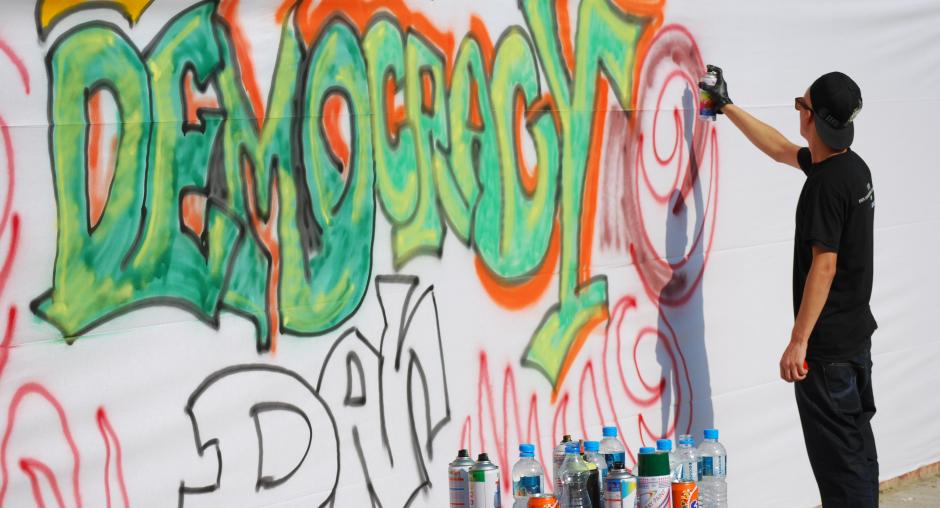OSCE Mission in Kosovo marks International Democracy Day
"I have the answer, I have the answer," shouts Gentiana Maxharaj (17), a high-school student from Klinë/Klina, a municipality in western Kosovo. She and 40 peers from six municipalities in the region gathered in Gjakovë/Ðakovica on 15 September 2010 to take part in a democracy quiz.
The quiz was one of 35 events organized by the OSCE Mission in Kosovo and dedicated to marking the International Day of Democracy, established by the UN in 2007.
"By organizing events to celebrate Democracy Day the Mission wanted to acknowledge progress achieved but also to highlight challenges ahead for Kosovo and its democratic processes," explains Edis Arifagic of the OSCE Mission's Democratization department.
Accepting the challenge of democracy
The OSCE has been instrumental in developing democratic structures in Kosovo since 1999. According to Arifagic, Kosovo now has functional municipalities and central level institutions, as well as electoral management bodies, media regulatory agencies and a fairly developed civil society sector.
"Nonetheless, many challenges remain," he says. "The performance of the institutions must be closely scrutinized along with their willingness to include the public in policy making."
The Mission used the slogan "Accept the Challenge of Democracy" to invite the public to take part in the events. The aim was to call on the public to get more involved in the work of municipal and central assemblies and to engage in decision making.
While in most municipalities the Mission supported municipal assemblies in organizing open doors sessions and interacting and exchanging views with the local residents, a number of events were organized to target youth in particular.
Youth involvement
"We wanted young people to have fun as they thought about democracy and their role in it," says Aneta Samotyj, a member of the OSCE municipal team in Rahovec/Orahovac, southern Kosovo. She and her team organized a street ball tournament and a painting workshop while the local radio "Start" kept the public informed of the tournament results throughout the day.
Rahovec/Orahovac's graffiti artists also got their chance to shine. Ardit Zvanoga (19) and a few friends painted graffiti reading "Peace and Democracy Day" on a sheet covering the wall of the local stadium. When asked what democracy was to him he said: "Freedom, just to be free."
People in Rahovec/Orahovac, Kosovo Albanians and Kosovo Serbs, have developed their own unique language "Rahovacki" - a combination of Albanian, Serbian, Turkish, Macedonian and even Polish and Romanian. However, the town is in many ways divided. The international troops in Kosovo, KFOR, still keep rolls of folded barbwire on the entrance to the Serb part of town as a security measure. Rodoljub Grkovic (28), a Kosovo Serb who assisted with the organization of the event, says the wires were put there in 1999 and 2004 and now they are still there to block off access to Serb houses should something go wrong.
Remaining challenges
Challenges obviously remain. In Pejë/Pec region, for most of the high-school students who took part in the quiz the challenge was freedom of movement, not only in Kosovo but world wide. "We still need visas to go anywhere," complained Maxharaj. Democratic rights to her meant "the freedom of movement, freedom of expression, right to vote, and the right to feel equal to all others."
"There is much work to be done," agrees Arifagic. "While we've had considerable success in developing representative democracy in Kosovo, freedom of the media and the autonomy of municipal institutions must be safeguarded, while parliamentary oversight must be strengthened along with the role of women in democratic institutions. These are all areas where the OSCE will continue to work on in the future."

